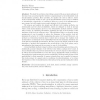Free Online Productivity Tools
i2Speak
i2Symbol
i2OCR
iTex2Img
iWeb2Print
iWeb2Shot
i2Type
iPdf2Split
iPdf2Merge
i2Bopomofo
i2Arabic
i2Style
i2Image
i2PDF
iLatex2Rtf
Sci2ools
ALGORITHMICA
2007
2007
On the Feasibility of Time Estimation under Isolation Conditions in Wireless Sensor Networks
We study the problem of providing a sensor with an accurate estimate of the time, from a novel perspective which is complementary to the well-studied clock synchronization problem. More precisely, we analyze the case in which a sensor node is temporarily unable to run a clock synchronization protocol due to failures or intermittent connectivity, or is willing to skip one or more clock adjustments to save energy, but still requires an accurate estimate of the reference time. We propose and analyze two simple and efficient clock reading methods, one deterministic and the other probabilistic, which are designed to work in synergy with a clock synchronization protocol. Our deterministic method achieves a better time accuracy by exploiting information regarding the sign of the deviation of the hardware clock from the reference time. This algorithm leads to noticeable energy savings since it can be applied to reduce the frequency of the periodic clock adjustments by a factor of 2, while main...
| Added | 08 Dec 2010 |
| Updated | 08 Dec 2010 |
| Type | Journal |
| Year | 2007 |
| Where | ALGORITHMICA |
| Authors | Daniela Tulone |
Comments (0)

